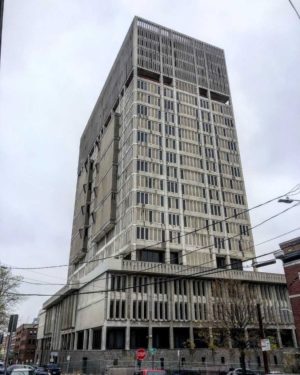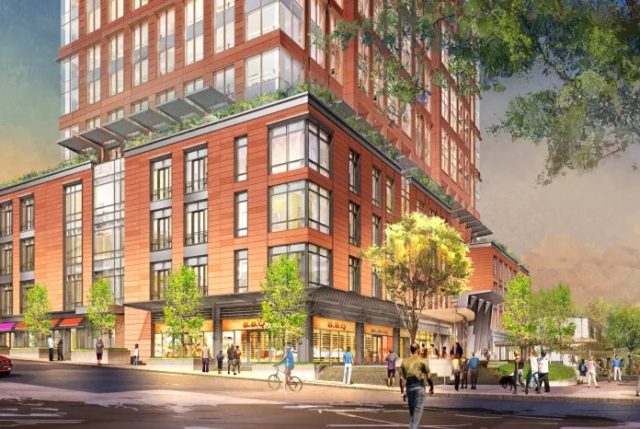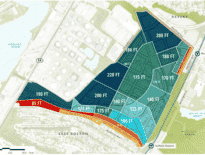
Developer Leggat McCall hopes to convert the former Sullivan Courthouse to 430,000 square feet of office space and 48 affordable apartments. Photo by Steve Adams | Banker & Tradesman staff.
Attempts to redevelop Cambridge’s former Sullivan Courthouse could culminate early this summer – or potentially roll back to the starting gate.
Boston-based Leggat McCall Properties is nearing the finish line in its six-year quest to convert the 22-story concrete monolith into 430,000 square feet of office space and 24 affordable apartments. If all goes the developer’s way, the Cambridge City Council will agree to lease out 420 parking spaces in a nearby municipal garage for $50 million, fulfilling a key outstanding condition of the 2014 planning board special permit approving the project.
But neighborhood activists and a state lawmaker remain unsatisfied. They’re lobbying against the garage lease, hoping to block the project and prodding the city into acquiring the 1.4-acre site at 48 Thorndike St., potentially partnering with a developer on a mix of affordable housing and open space.
“You can draw a concentric circle around the courthouse site and in every direction, there’s massive luxury and commercial development going on,” said state Rep. Michael Connolly, D-Cambridge.
Leggat McCall argues that the troubled building – vacated a decade ago because of asbestos contamination and poor air quality – is likely to remain a dormant eyesore unless a private owner pays for remediation as part of a redevelopment.
“Whether the building is renovated or demolished, the assessed cost for remediation is now estimated at nearly $50 million, which needs to be completed before redevelopment of the property can begin,” Leggat McCall Executive Vice President Rob Dickey said in a statement. “The asbestos issue obviously involves both cost and significant risk, and we believe Leggat McCall Properties can successfully execute the project to serve the city of Cambridge and its residents.”
Identify New Prospects with Targeted Marketing Lists
Property owners are a prime target market for insurance, banks, real estate, home improvement, investment, and most retail and home service businesses. With information on more than 130 million households – encompassing 94 percent of the U.S. population – we invite you to learn more about how The Warren Group’s Targeted Marketing Lists can generate more quality business leads to develop your business.
The company also has agreed to a community benefits agreement totaling $34 million, which includes the $12 million value of the affordable units, a mandatory $7 million linkage payment for affordable housing and another $4.5 million to the city’s affordable housing trust.
Leggat McCall also agreed to set aside ground floor space for a year-round farmers’ market in the municipal garage and to favor local tenants for the 10,000-square-foot retail space in the courthouse building.
Developer Offered $33M in 2011
Leggat McCall was the high bidder in 2012 when the state Division of Capital Asset Management and Maintenance (DCAMM) made the property available under a traditional land disposition. A $33 million purchase-and-sale agreement was signed in January 2013 and has been extended several times, according to Connolly, amid the project’s delays. DCAMM spokesman Matthew Cocciardi declined to comment on the expiration date.

Steve Adams
After fending off litigation that delayed the project for three years, Leggat McCall has spent the last year arranging for a location for off-site parking, as required by its special permit from the Cambridge Planning Board. The proposed site, the city-owned First Street parking garage, requires support from two-thirds of the city council to lease out 420 of its 1,090 spaces to Leggat McCall.
In exchange, Leggat McCall is offering over $50 million in lease payments over 30 years, along with $1.3 million toward building improvements over the term of the lease, and a $1.9 million upfront payment for a solar installation and electric vehicle charging stations.
The special permit granted by the Cambridge Planning Board in 2014 also requires Leggat McCall to provide 92 parking spaces in the existing underground courthouse garage.
Councilors’ decision will be influenced by a recent study analyzing the usage of the parking garage, which already reserves approximately half of its spaces to tenants of nearby privately-owned office buildings.
The city council is expected to take up the issue as soon as June, following the completion of an advisory memo by City Manager Louis DePasquale.
A Sore Spot for Neighbors
Located just blocks from the massive biotech campuses of Kendall Square and the busy CambridgeSide shopping mall, the Brutalist courthouse towers over a largely residential neighborhood.
Completed in 1972, it remains an irritant to neighbors who fought its original construction. The East Cambridge Planning Team, a neighborhood association, opposes the Leggat McCall plan and argues that the project should have been reviewed in the context of the broader East Cambridge development boom.

Leggat McCall Properties hopes to revamp the cladding of the 40 Thorndyke St. building. Photo courtesy of Leggat McCall Properties.
Boston-based New England Development is seeking to rezone its CambridgeSide mall property to allow office, research space and residential development, and Cambridge developer Urban Spaces is beginning construction of a 136-unit apartment complex as part of its $275 million First Street Corridor project including office, retail and residential space. And DivcoWest is leasing up to 2.1 million square feet of office and lab space at its Cambridge Crossing development, including a new Massachusetts headquarters for Sanofi Genzyme.
As for the courthouse project, the East Cambridge Planning Team’s Chris Matthews said the city is under no obligation to lease parking in a municipally-owned building to a developer.
“They knew this was going to be process,” Matthews said. “It’s not incumbent on the neighborhood to help them out of this mess. They have not spent significant money beyond consultant fees, and the price they bid [in 2011] has held, and that sounds like a pretty good deal to me.”
Connolly, the state representative, is calling for the state to hit the reset button on the disposition process. A new land disposition model by DCAMM, the “sale partnership program,” enables Massachusetts communities to buy surplus state properties and market them to private developers, splitting the eventual proceeds with the commonwealth. Connolly said a redevelopment of the site should maximize its affordable housing creation, with a lower-density program of up to 200 residential units.
“Our leading concern is affordable housing,” he said. “It’s well-documented that high-end commercial development tends to have a negative impact on affordability in a neighborhood.”
Editor’s note: This article has been updated to correct the dates of Leggat McCall’s bid and purchase-and-sale agreement on the courthouse property.




 |
| 
